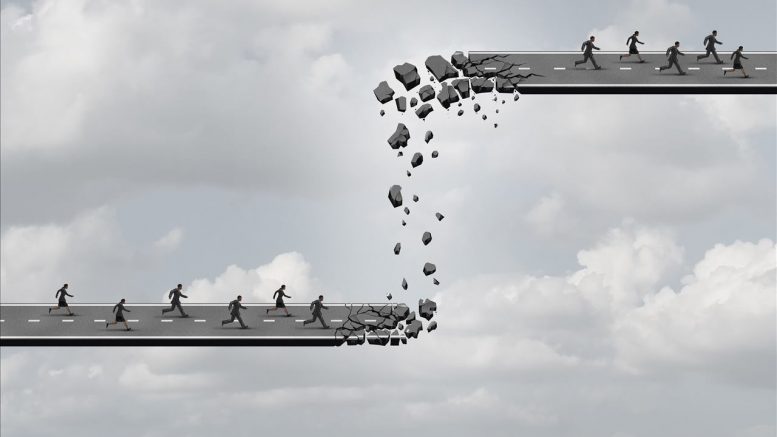Strip away from Brexit the bitterness, debate and division and what is left – an abrupt change of circumstance with a future that is unknowable, concludes John Egan.
There has been no shortage of prediction of the outcome for Brexit, from the multiple conflicting versions of “Project Fear” to a trade deal that should be the “easiest in history”.
Such predictions have a common assumption – that the consequences of Brexit will arise from a mass of incremental social and economic adjustments in the UK and Europe. Tomorrow the sun will rise just as it did today, but the weather may be different. However, this assumption itself may not survive the unfolding of events.
Depending on its final form, Brexit to some degree may be seen as a rare case of punctuated evolution through which an existing status quo is decimated by rapidly changing environmental factors [1]. It makes the future highly unpredictable.
In companion articles Chief-Exec.com has described how normally an enterprise and a household can each survive and thrive on account of their differences with their external environment – they rely on their special attributes to give them their “edge” (see below).

Households and enterprises each host a Maxwell’s Demon to select valuable (hot) attributes from the external environment to enable the creation of their own value and find their “edge”.
In each case, enterprises and households build a relationship with their outside world based upon the value they are able to create and produce for consumers. Production is the replication of information to communicate a perception of value. Creation is the origin of that information.
Energy is expended within an enterprise and household on the production of inventories for sale and acquisition in the outside world – transactions upon which survival depends. Energy is also channelled through creative endeavours, and this is devoted to the relationships created with the outside world. It appears as value perceived – as innovation [2].
This shared perception of value may be seen as social capital [3] that is created by investment in the innovative activities of an enterprise and indeed a household. Much endeavour in both is expended growing the social capital that essentially provides the “edge” that offers the promise of well-being.
As the innovations and production of enterprise and households are sold into their external environment, they inevitably change this to some degree. If there were to be no effect, these economic agents would not be sustainable. Existing social capital is destroyed, to be replaced by perceptions of value that have evolved to be more suited to their place and time. This evolution is normally incremental [4].
In the above deconstruction of the mechanism of everyday life, the outside world is considered more-or-less stable. For changes that do occur, they normally take place slowly, over years.
The punctuated form of evolution is altogether more spectacular, as the glacial drift of incremental evolution is disturbed by rare seismic events. Small adaptations rapidly lose their relevance and value. The clock is reset for a new era.
And, so it could be the case for Brexit.
The “outside environment” for UK enterprises and households has for 40 years been provided by the trading treaties upon which the European Union is based. Embedded social capital everywhere is determined by this environment and countless hours of endeavour have been devoted to its formation both in the UK and Europe.
A particular problem with social capital is that it is as intangible as its associated perceptions of value. It largely goes unmeasured. Its accounting appearance as sunk costs, investment that cannot be returned through future transaction, make it appear ephemeral [5]. Nevertheless, a substantial destruction of this intangible capital will be fundamental to the outcome of Brexit.
The future will be determined by the destruction and then reconstitution of perceptions of value across national populations.
So, what then can be safely concluded.
- The transition deal negotiated by the Theresa May government, along with its embedded negotiations, essentially creates a buffer to soften the impact of the Brexit changes over its two-year duration. With time for the replacement of obsolete social and economic capital, the status quo will have a chance to adapt and evolve incrementally.
- On the contrary, a no-deal Brexit will bring with it a widespread destruction of social capital on the 30th March 2019. Previously nurtured value perceptions will be destroyed.
- In the short-term, much of what worked before will no longer be valid and much new information will urgently be required. The demand for skilled labour could be profound.
- Enterprises and households with the relevant know-how, with a relevant “edge”, will survive and thrive. Others will do less well. Dinosaurs will die.
- Winners over the longer term will, as always, be those able to adapt to changing circumstances.
Companion articles
Maxwell’s Entrepreneur: finding the edge
Maxwell’s Consumer: seeking a sustainable world
Notes
[1] One radical example of such an environmental event occurred 65 million years ago when an asteroid struck the Yucatán Peninsula in Mexico. It brought about the rapid extinction of dinosaurs after their 165-million-year occupation of Earth.
[2] Within the accounts of an enterprise, production appears as cost of goods – first in inventories and then as goods sold (COGS). Innovation comprising the remaining cost, is accounted for as operating expenses.
[3] This social capital in an enterprise would include company R&D, personnel development, process routines, know-how, advertising, marketing and sales and the consumer relations that arise.
[4] This evolutionary mechanism also appears in the creative destruction that is associated with Austrian economist Joseph Schumpeter.
[5] It is the economic equivalent of dark energy – apparent only through its effects that can be observed. There are some bold statistical ventures trying to get a grip on this.

Headline Photo Credit: Lightspring/Shutterstock.com
Maxwell Demon graphic: Sergey Merkulov/Shutterstock.com




